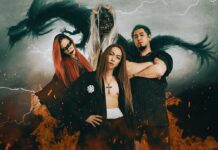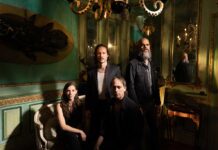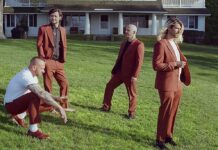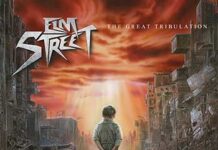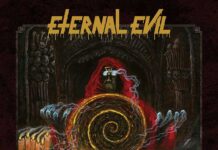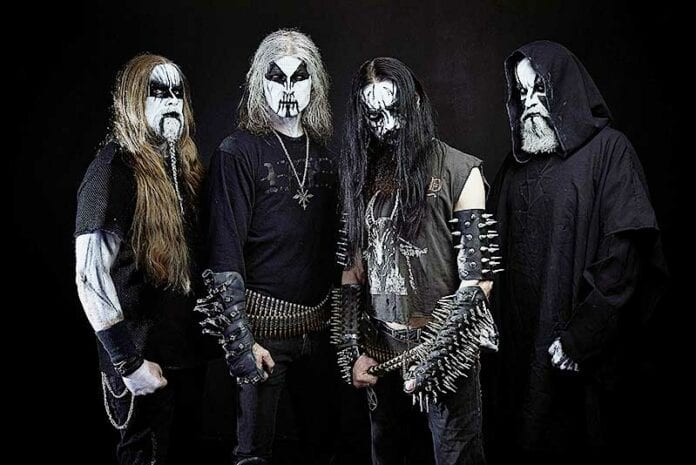
INTERVIEW WITH OLAV “RAVN” BERGENE BY JOE DALY
PHOTOGRAPHS BY DMITRY VALBERG
The Psycho Las Vegas festival suffered no shortage of spectacular moments, none more sublime than 1349’s Sunday evening set at the Mandalay Bay Beach. As thousands of jubilant headbangers—many clad in denim and leather—moshed and frolicked in the enormous wave pool and the sandy beach surrounding it, 1349 delivered an absolutely pulverizing set of classics that emerged as one of the festival’s unqualified highlights.
This fall, The Infernal Pathway sees the legendary black metallers returning with an absorbing 11 track odyssey that showcases some of the band’s most aggressive and ambitious efforts to date. We caught up with 1349’s founder and frontman Ravn to discuss the songwriting process and the unique creative directions within the record. He also shared one of his favorite US television shows, and there’s no way you’ll guess which one it is.
So, you guys played the pool stage at the Psycho Las Vegas festival.
(laughs) Yeah, I didn’t know there was a pool party, but I found out when we got there. We’ve played on a lot of different stages at various festivals over the years, so the idea of a beach stage didn’t exactly stand out as anything vastly different until we got there and discovered that there actually was a beach in front of the stage. It’s always something.
“YOU CAN BRING DARKNESS AND GRIMNESS TO EVEN A BEAUTIFUL PLACE AND IT WILL STILL HAVE AN EFFECT”
What was it like to stare out at an army of metalheads moshing on a beach inside a resort in Las Vegas?
You just have to take it as another day at the office. It’s inspirational to play in so many different places, and that’s why we perform live—to meet the fans on their ground and to see various parts of the world on top of that. It just goes to show that you can bring darkness and grimness to even a beautiful place and it will still have an effect (laughs). I’ve seen a couple of the pictures and it looked epic, with the purple sky in the background. It was fantastic.
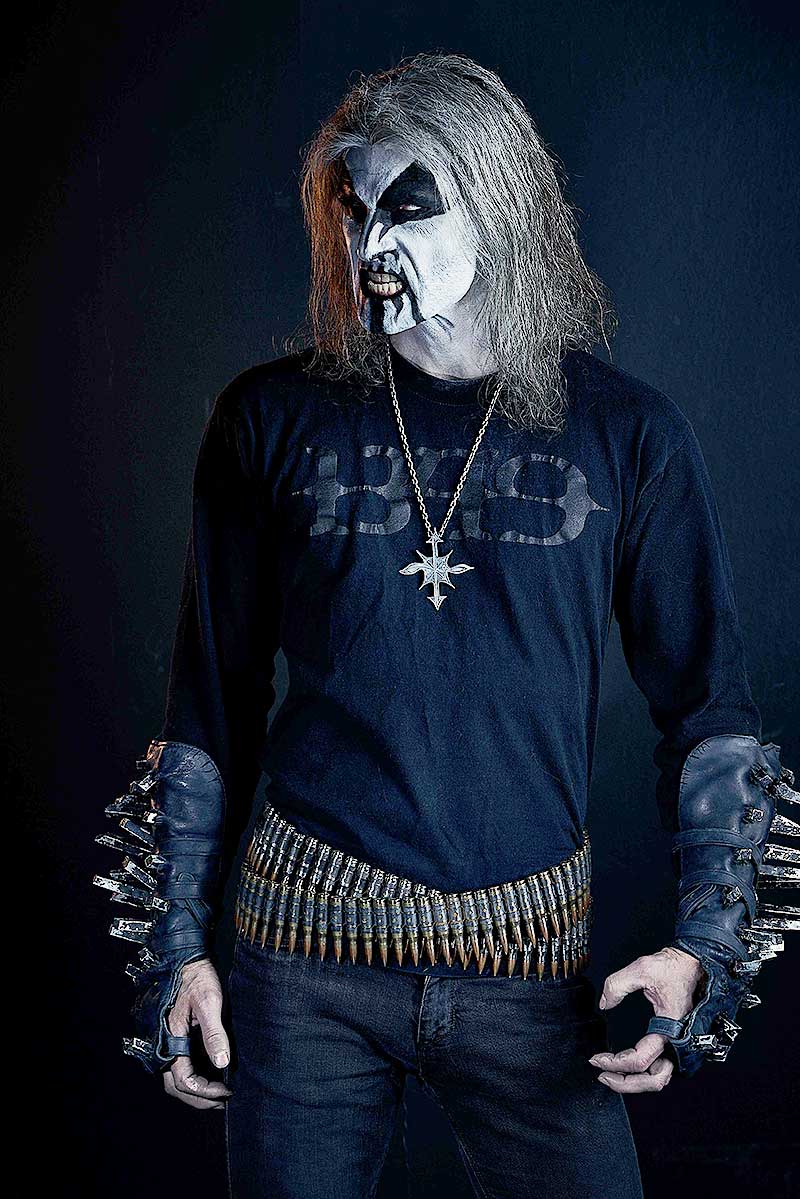
Let’s talk about The Infernal Pathway. What were the band’s ambitions going into the recording process?
Well, since it’s the seventh album, it goes without saying that it holds potential for going in a very occult direction, and I feel like that’s something we accomplished. Musically, it’s a deeper and darker sounding album. Also, the music also holds more groove to it, especially the drums. Frost has developed tremendously as a drummer in recent years, and he’s actually developed a much more groovy playing style. During rehearsals, there was more of a playful collaboration between Frost and Archaon [guitar], and I think that’s really showcased on the album.
“IT EXPLORES HOW THE MIND CAN DEVELOP AND HOW IT CAN BE YOUR GATEWAY TO EVERYTHING.”
Thematically, there seems to be stronger and more overt connections between the songs.
Yes, the lyrics have also changed a bit on this album. There’s a darker and more meditative aspect that takes you deeper into the mind. It explores how the mind can develop and how it can be your gateway to everything. Also, the artwork has tremendous occult significance that surpasses anything used with prior recordings.
Do you introduce these occult perspectives as a way of connecting with the listeners?
Definitely. When we record, we lay out all of our thoughts and energies into these songs. I truly believe that through these songs, that energy can be felt on the other end. Especially with the proper production, which we obviously have on this album. Jarrett Pritchard [producer] did a fantastic job of capturing all of our energy. That’s something that you can really feel as a listener.
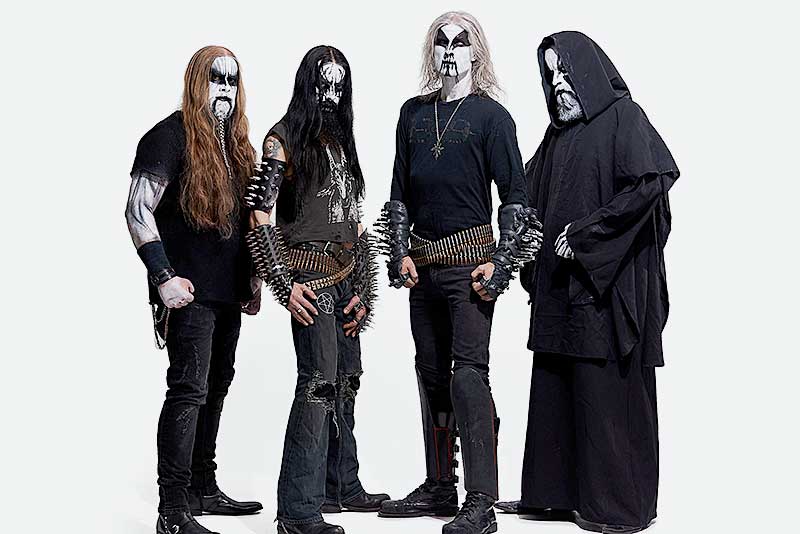
The opening track, “Abyssos Antithesis,” begins with a dramatic guitar part before a harder, more traditional black metal tempo kicks in. What made this best suited to open the album?
It was Archaon that suggested the order for it. When you go through the order of the songs and listen to them, you realize that it’s the perfect opener. As you say, it starts a bit atypical. It’s a song that sort of lures you in. Then it hits with that outstanding thrashy opening. It really gets your head nodding when it hits, and it hits you hard. Hopefully, you’ll be sold for the whole album.
“Tunnel Set I – VII” first appeared on Demonoir and it continues here. What is the significance of this?
It was something we started on Demonoir with the intention of interconnecting all of the songs with a sonic soundscape in between them. With a couple of the songs on this new album, we felt like they needed a proper lead-in from the preceding track to make the album more whole and to make the transition between certain songs more smooth. We thought back to Demonoir and realized that these new songs also needed some tunnels in between them, so we just continued with that term.
You’ve said that it’s a myth that black metal should be poorly produced to be authentic. What was important to you about the production of this record?
I always say that it has to have the right sound and that it’s a misperception that a lo-fi or a bad sound is right. For us, it’s about getting the right sound, which is whatever is going to get the maximum effect from the songs. This is why the drum production needs to be rich, big, and powerful. The material also has an edge to it, so the guitar parts need to be distorted enough to deliver the rawness of the material with precision and the right feeling. Put together, this is what makes the right sound, and it varies from album to album because it depends on the material.
It’s sometimes said that the most significant works of art are those where the artist took a considerable risk. What risks do you feel like the band took on The Infernal Pathway?
Well, I don’t think of songwriting in terms of risk. We just do what we think is necessary. We don’t approach it thinking that we have to please our fans or that we have to sound in a certain way. That would be counterproductive and completely wrong from an artistic perspective.
“YOU HAVE TO BE TRUE TO YOURSELF TO DELIVER A MAXIMUM PERFORMANCE IN YOUR ART AND THAT’S WHAT WE’VE BEEN DOING THE WHOLE TIME”
You touch on something that permeates all styles of music—the expectations of fans. For many in black metal, it’s not simply enough that a band stays true to its vision. The band must also sound and look a very specific way. Do fan expectations ever play into your process?
You have to be true to yourself to deliver a maximum performance in your art and that’s what we’ve been doing the whole time, even with Revelations of the Black Flame [2009], which people seem to think is the one that really stands out. And it does. There are a lot of bands that play fast and aggressive music, but it’s the conviction that we have in doing that that defines us. We’re not in it for the commercial angle, we’re in it for the long run. This is our legacy.
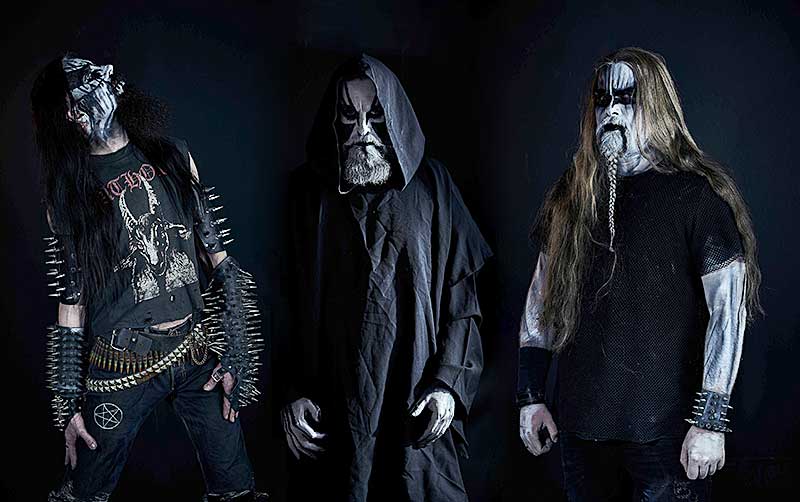
What are the relationships within the band like these days?
It’s how it’s always been (laughs). That’s why it’s always been such a steady lineup. It’s first and foremost a creative relationship. I said very early on in our career, “We’re not friends in the band,” and a couple of years later, Archaon mentioned that he had read that. And he commented, “I remember reading this and I was a bit offended by it. But now I understand what you meant.” We see each other every day on tour, and when we’re out on the road together, we have no problem dealing with each other and being around each other. At the same time, we don’t team up and go for a beer when we’re back home. 1349 was formed to maintain and preserve Norwegian black metal. I didn’t like how black metal had turned in the late 90s, with its goth inspired direction. I wanted it to be more harsh and grim and to have a brutal edge to it. That’s why, instead of complaining on the internet or sitting around the pub complaining about it, I took action and formed a band. Then I picked people who could be up to the task. It’s not that we’re a bunch of friends who wanted to play black metal together. 1349 was formed with a different goal in mind and it’s worked well so far. Of course, you never know. Everything ends!
That’s the most black metal thing you could say.
(laughs) It’s true! Everything dies.
As you mention, you formed 1349 as a response to the dilution of black metal, and it seems like that’s happening again with crossover bands like Deafheaven. A black metal purist might write that off, but others might see a benefit if that music leads new listeners back to those original Norwegian bands that started it. Do you see this in positive or negative terms?
As you say, if it makes people want to go deeper, then it could be positive. Take a band like Dimmu Borgir. If it makes listeners want to check out this genre called black metal, then maybe they’ll discover us, so, of course, that’s an advantage. It will always come down to every individual and what they end up doing. If they’re looking for a darker style, then they’ll probably prefer us, and if they prefer a lighter or melodic sound, then they’ll stay with that band. We play so far out that we obviously know that we’re not in a very broad commercial market. But that’s okay. We’re very much okay with that. If there’s some commercial success from that, it would come from what we’re authentically doing and not from us trying to sound like something in order to achieve success. You have to be true to yourself and that will reflect in the music.
Outside of music, what sort of entertainment do you enjoy? Any particular books or films?
Hmm…lately I’ll just find a television show and binge the whole thing until I’m through with it. I do like your Rick and Morty. It’s so dark and dystopic, and in that comic wrapping, it’s fantastic! There’s no hope whatsoever (laughs). People can say that comics are not black metal, but it doesn’t matter. It’s just fantastic entertainment. I nod my head many times when Rick goes on about infinite timelines and infinite universes. For more artistic views, I do think that the third season of Twin Peaks had some really good moments, although not all of it was stellar. But it was nice to be able to go back to that feeling again, since it’s been 25 years since the last season. But it had its moments, and David Lynch was able to bring back some of the eerie moments that the original show created.
“THINKING IS OVERRATED WHEN IT COMES TO ENJOYING ART.”
David Foster Wallace wrote perhaps the definitive David Lynch essay from the set of Lost Highway. Were you a fan of that film?
That movie is pretty interesting, to say the least. It’s a good reference with David Lynch movies because you have to just watch and take it in. You can’t think while you watch it. You just have to experience it and then later think about it in retrospect. It’s a feeling that I want people to experience when listening to our music. I don’t want you to think. I want you to take it all in and then hopefully you’ll think about it in retrospect. What was it? What did it do? Or just enjoy the feeling that it gives you without thinking too much about it. Thinking is overrated when it comes to enjoying art.







